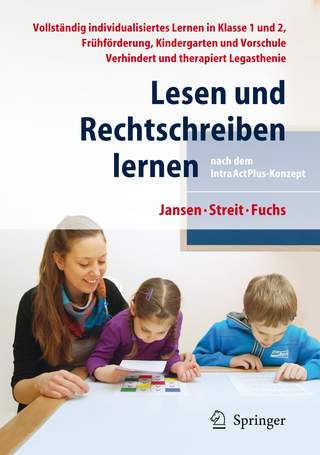
Educational Psychology
Pearson (Verlag)
978-0-205-62607-6 (ISBN)
Renowned scholars, Sternberg and Williams help readers capitalize on their strengths by integrating questions into the text that encourage analytical, creative, and practical thinking. This framework, based on Sternberg’s triarchic theory of human intelligence, helps ensure that readers think deeply about what they are learning, rather than merely processing information at a superficial level.
1. Becoming an Expert
The "Thinking" Triangle
What Is An Expert Teacher?
What Do We Know About Expert Learners?
How Educational Psychology Helps Create Expert Teachers and Learners
I. HUMAN DEVELOPMENT
2. Cognitive Development
Cognitive Development: Concepts for Teaching
Piaget's Stage Theory of Cognitive Development
Vygotsky's Sociocultural Theory of Cognitive Development
Information Processing Theories: Examining Learning and Memory Skills
Three Major Approaches to Cognitive Development: A Comparison
Theory of Mind
Language Development
Brain Development
3. Personal, Gender, Social, and Moral Development
Why Understanding Personal, Gender, Social, and Moral Development Is Important to Teachers
Personal Development: Becoming Unique
Temperament
Sexual and Gender Development: Acquiring Gender Roles
Social Development: Learning to Interact with Others
Moral Development: Acquiring a Sense of Right and Wrong
Identifying, Understanding, and Managing Developmental Risks
II. HUMAN DIVERSITY
4. Individual Differences: Intelligence, Cognitive and Learning Styles, and Creativity
Why Understanding Individual Differences Is Important to Teachers
Understanding Individual Differences in Intelligence
Current Educational Controversies in Intelligence
Cognitive Styles and Learning Styles
Understanding Individual Differences in Creativity
5. Individual Differences: Exceptional Children
Why Understanding Exceptional Children Is Important to Teachers
Teaching Exceptional Children
Extremes of Intellectual Functioning: Giftedness.
Extremes of Intellectual Functioning: Mental Retardation
Challenges to Learning
6. Group Differences: Socioeconomic Status, Ethnicity, Gender, and Language
Why Understanding Group Differences Is Important to Teachers
Socioeconomic Diversity
Ethnic and Racial Diversity
Gender Diversity
Language Diversity
Multicultural Education
III. THINKING, LEARNING, AND MEMORY
7. Behavioral Approaches to Learning
Why Understanding Behavioral Learning Is Important to Teachers
Learning by Classical Conditioning
Learning by Operant Conditioning
Social Learning
Cognitive-Behavioral Modification
8. Cognitive Approaches to Learning
Why Understanding Cognitive Approaches to Learning Is Important to Teachers
The Standard Memory Model
Alternative Models of Memory
Retrieving Information
Constructivist Approaches.
9. Thinking: Concept Formation, Reasoning, and Problem Solving
Why Understanding Thinking Is Important to Teachers
Concept Formation
Reasoning
Problem Solving
Transfer
Decision Making
Teaching for Thinking
IV. MOTIVATION AND INSTRUCTION
10. Motivating Students
Why Understanding Motivation Is Important to Teachers
Intrinsic and Extrinsic Motivation
Four Ways to Understand Motivation
The Role of Arousal Level
The Role of Student Goals
The Role of Student Needs
The Role of Student Attributions and Beliefs
Motivating Challenging Students
11. Classroom Management
Why Understanding Classroom Management Is Important to Teachers
How Effective Teachers Manage Their Students
Developing and Implementing Rules and Procedures
Maintaining Control and Preventing Problems
Special Approaches to Classroom Management
12. Classroom Teaching
Why Understanding Classroom Teaching Is Important to Teachers.
Principles of Teacher-Centered Teaching
Principles of Student-Centered or Constructivist Teaching
V. ASSESSMENT
13. Standardized Testing
Why Understanding Standardized Testing Is Important to Teachers
What Are Standardized Tests?
Types of Standardized Tests
Assessing Test Quality
Interpreting Standardized Test Scores
Issues and Concerns in Standardized Testing
14. Classroom Assessments
Why Understanding Classroom Assessments Is Important to Teachers
Traditional Assessments
Authentic Assessment
Grading and Reporting
References
Name Index
Subject Index
| Erscheint lt. Verlag | 1.2.2009 |
|---|---|
| Sprache | englisch |
| Maße | 211 x 276 mm |
| Gewicht | 1250 g |
| Themenwelt | Geisteswissenschaften ► Psychologie ► Pädagogische Psychologie |
| ISBN-10 | 0-205-62607-6 / 0205626076 |
| ISBN-13 | 978-0-205-62607-6 / 9780205626076 |
| Zustand | Neuware |
| Informationen gemäß Produktsicherheitsverordnung (GPSR) | |
| Haben Sie eine Frage zum Produkt? |
aus dem Bereich


